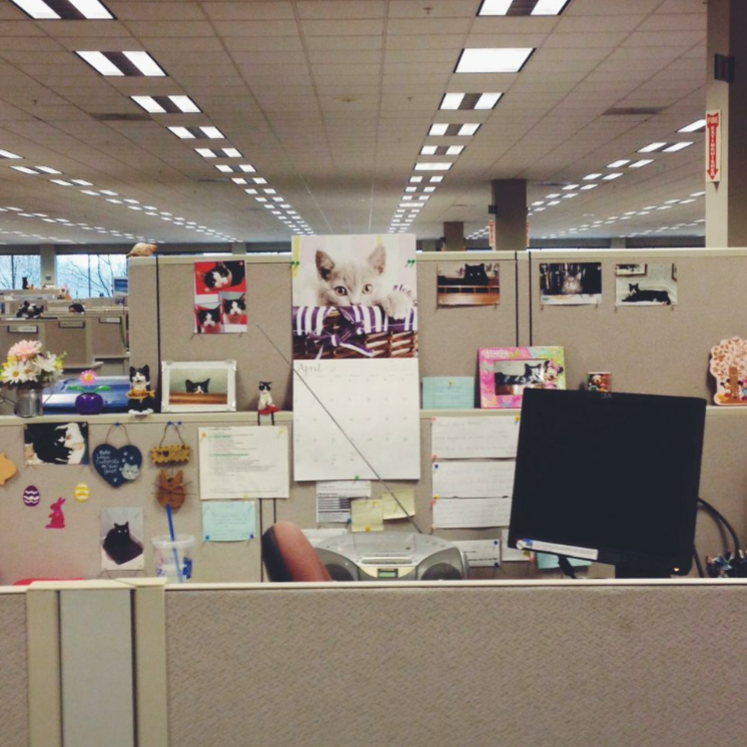How To Work For Yourself And Quit Cubicles Forever
Before things get crazy here and you start turning in your ID badges, did you subject yourself to my first reality check: 5 Realities Of Self Employment: Is It For You? Ok, well can you take care of that real quick while I roll my eyes?
And if you're not able to check some of the things off that list, then you can just stop reading now because you'd make an awful self-employed person.
So once you have the desire —and some of the necessary abilities —how do you make the transition? Welp. I'd love to tell you that's the easiest part, but that would be like telling you I'm not currently wearing a t-shirt with a stack of melted buttery pancakes on it, that says, "I'm a hot mess."
And that would just be a bold faced lie.
Anyway, back to me. As mentioned in part 1 of this self-employment series, in 2014, I quit my corporate job to run a full time wedding photography business. About five years ago, I had decided that I wanted to turn my hobby of photography into a job. Not only because I wanted to work for myself, but I had many health issues to deal with.
But I couldn't just up and quit a stable job in hopes that somehow things might work out. Duh. It was a slow, progressive path that took alot of time and hard work—but it paid off.
Let me just say this: following your passion will be the easiest and hardest thing you'll ever do. The hardest because it's a road of opposition, financial uncertainty, and intermittent doubt. The easiest because you'll no longer wish your days away longing for the weekend, you'll have pride in what you do, and you’ll be building your dream— not someone else’s.
How To Prepare to Work For Yourself:
Be aware— unless you have someone supporting you while you’re doing this — you’ll be working double time for awhile: your regular job and also building your business.
1. Decide on ONE marketable good or service. Ideas make the world go 'round, baby, but they don't pay for shit. You obviously need a money maker if you're planning on quitting your job. I'm assuming you know this, but I'm just here to present the facts.
It's important that you focus on ONE thing— as creatives tend to sprawl in many directions. Since you're still going to be working full time while you are building your own business, you need to be very specific in focusing your time and efforts.
And I think it goes without saying that you actually need to be really good at this service, or whatever you're trying to sell. This all comes back to being realistic.
2. Build your portfolio (aka give away lots of free stuff). For a service based business: no one is going to pay you unless you have proof that you're good at it. Just like you need a resume with experience to get a good job, you need the same thing for your own business, called a portfolio. This would be true for graphic design, photography, freelance writing, interior designer, etc.
Well, unfortunately, you can't build a portfolio if no one wants to hire you because you have no portfolio. That's where you need to let it go Frozen style and start giving away the farm. I gave away photo shoots to all my friends and family for two years while I was just improving my skills and trying to build up my portfolio.
There are lots of Facebook groups these days for small businesses, freelancers + entrepreneurs where you can make connections to start working!
For a goods based business: Same idea, but instead you need to reach out to bloggers, store owners, anyone who will try your product and possibly talk about it, sell it, or review it. Getting the word out is what your goal is here. You're going to be giving a lot of product away, which is more frustrating than a service based situation because you're going to be spending more money during the initial startup.
3. Be prepared for exhaustion. In order to build a business while you're still working full time, it's going to be exhausting. It just is. And you gotta suck it up to get to that light at the end of the tunnel. Not that light. The less creepy light that involves shoveling chocolate chips in your mouth on Monday morning at 10 am in your PJs.
It took me awhile to get to the light, but it was certainly worth it. I went from buying my first DSLR in 2008 and not even knowing how to use it to shooting my first wedding in 2011. I was doing photo shoots and weddings along side working full time. My week nights and weekends consisted of editing, learning /researching equipment, communicating with clients, working on my website and social media, and blogging.
4. Prepare to spend all the money you make on your business. In the first few years, you are going to be in a constant cycle of reinvesting. Do I really need to say it? Don't. Don't make me. It just sounds so stupid. You need to spend money to make money. Ugh. Why did you have to do that?
So this is yet another reason why you need to work your cubicle job concurrently while you startup your own business. It's okay though, because this will help you practice your money management ability, as mentioned in 5 Realities of Self-Employment.
5. Know the right time to quit. This is always the big question. Second to the other big, slightly more awkward question involving a lifelong commitment and a shiny ring. But let me preface this by saying: quitting your stable 9-5 to work for yourself is always going to be nerve-wracking. There is no perfect time to do it — just better times than others.
You obviously need to wait until a point where your business is consistently making money and acquiring clients. In my case, I waited until I had at least five weddings booked for the following year before I quit my other job. My goal was 10 weddings/year, which would replace my current income. Of course, there was no guarantee that more clients would keep coming, but it's always a gamble no matter how you look at it. That's the moment when you have to say, "Ok. I've prepared, I'm committed, and I'm diving in."
If you're smart, you should sort out these things before quitting: health insurance, getting your DBA, LLC, or whatever business certification you are going for, savings (preferably 6 months worth of expenses), a separate business account, websites, business cards. Get all this crap taken care of while you still have constant money coming in.
Got it?
Wondering who's the mysterious wordy genius behind these posts? Follow this little rabbit trail to read more About Me! The use of the term genius is open to interpretation. Like just about everything else on this site.







